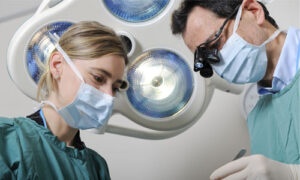Clinic Overview
Mohs surgery is a highly technical, mapped surgical technique used to treat skin cancers. Mohs surgery is now seen as the single most effective technique for removing Basal Cell Carcinoma (BCC) and Squamous Cell Carcinoma (SCC) – the two most common forms of skin cancer. Cure rates for BCC and SCC may be 99% with Mohs surgery, which is higher than standard excision or any other accepted method. Mohs surgery is also an effective treatment for other types of skin cancers; Mohs surgery is also as a method for treating patients with melanomas in situ (Lentigo maligna) with the use of immunohistochemistry.
The procedure allows removal of the malignant cancer in stages, sparing as much normal tissue as possible.
During Mohs surgery, our specially trained Mohs practitioner removes all visible skin cancer and the tissue is sent to our Mohs Laboratory, where it is immediately processed so that 100% of the margin can be examined microscopically to check the skin cancer has been completely removed. If not, tissue further narrow margin is removed and the pathology process is repeated.
With traditional surgical removal of skin cancers, only about 1-3% of the tumour margins are examined, which, when compared to Mohs surgery, increases the chances that a small tumour cluster will be missed and left behind. Mohs surgery allows for examination of 100% of the tumour thereby minimising the chance of tumour cells being left behind. Tumours can be confidently cleared with narrower margins than is possible with standard surgery preserving as much normal skin as possible and resulting in smaller defects needing repair.
Mohs surgery is especially useful for skin cancers that:
- have a high risk of recurrence or that have recurred after previous treatment
- are located in an area where you want to preserve as much healthy tissue as possible (e.g. on the nose, ears or around the eyes)
- have borders that are hard to define
- are large or aggressive in behavior.
Even if Mohs surgery is the most appropriate treatment for a skin cancer, some patients may not be good candidates for Mohs if they are unable to tolerate local anaesthesia, have extreme anxiety, have a surgical phobia, or are in very poor health. Any concerns of this nature will be addressed in our pre-operative consultation.
Clinic Schedule
The Mohs Surgery Clinic runs fortnightly on a Thursday, weekly on a Monday and weekly on alternating Wednesday and Fridays.
Surgeons
Mohs surgery can only be carried out by Mohs practitioners accredited by the Australasian College of Dermatologists. There are several Mohs surgeons working at the Skin Health Institute and the Institute is one of the few recognized training facilities for Mohs in Australia.
Mohs specialists are specially trained dermatologists who have undertaken a minimum of an extra 1-2 years of approved Mohs surgery training. Approved Mohs surgeons are both Fellows of the Australasian College of Dermatologists (FACD) and accredited Mohs specialists.
Mohs specialists are required to undertake regular quality assurance programs in diagnostic dermatopathology, run by the Royal Australasian College of Pathology, and the rigorous standards applied by the Australasian College of Dermatologists.
FAQs
Mohs surgery is used primarily for treatment of head and neck basal and squamous cell cancers. It is particularly useful for skin cancers in challenging areas such as nose, eyelids, lips and ears. It is also used on hands and feet, where there is not a lot of extra tissue for large surgical removals. While it is more often used on the face, neck, hands and feet, any area of the body may be treated using Mohs surgery if it is assessed as being clinically indicated.
While Mohs surgery is overall a very safe and effective surgical treatment, like any surgery or procedure there are some possible uncommon complications. Most patients tolerate Mohs surgery very well without any complications. Like all surgery Mohs surgery does leave a scar but after a few months, most patients will have only a very fine, barely visible scar.
As with all surgeries complications may arise. A list of these complications include:
- Bleeding
- Bruising
- Swelling
- Incomplete removal of cancer
- Pain afterwards
- Infection
- Scarring
- Numbness
Your surgeon will discuss associated risks and complications. Patients should speak to their doctor about any concerns or questions they may have.







